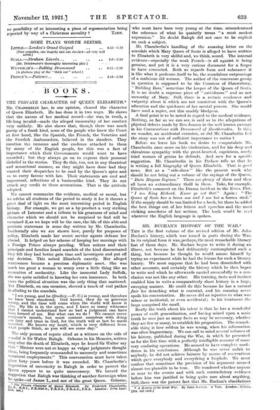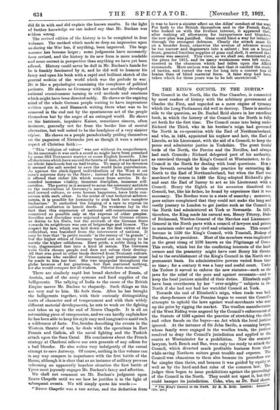MR. BUCHAN'S HISTORY OF THE WAR.* Tars is the first
volume of the revised edition of Mr. John Buchan's history, which was issued in parts during the War. In its original form it was, perhaps, the most remarkable literary feat of those days. Mr. Buchan began to write it during an illness, not because he had deliberately contemplated such a thing, but because he thought ho would amuse himself by trying an experiment while he had the leisure for such a literary luxury. We must suppose that he had been dissatisfied with other accounts, and certainly the history which ho then began to write and which he afterwards carried successfully to a con: elusion was not like any other. His training, taste and instinct enabled him to write a comparatively short history in a large, sweeping manner. Ho could do this because he has a natural flair for detaching what is essential, and his roaming never spoils his concentration. He never did an injustice to what was minor or incidental, or even accidental ; in his treatment the large comprised the small.
Really the truth about his talent is that he has a wonderful power of swift generalization, and having seized upon a main truth he uses just as many facts as may be necessary, whether they are few or many, to establish his proposition. The remark- able thing is how seldom he was wrong, when his information was often fragmentary. We can call to mind several volumes of his history, published during the War, in which he presented us for the first time with a perfectly" intelligible account of some very confusing operations. He seemed to have complete confi- dence in his conclusions. Although he was never unfair to anybody, he did not achieve fairness by means of reservations which gave everybody and everything a loophole. Wo must confess that sometimes the precision of his argument seemed almost too plausible to be true. We wondered whether anyone so near to the events and with such contradictory evidence before him was justified, in being quite sure about anything, Still, there was the patent fact that Mr. Buchan's elucidations • A History of the Grout War, By John Buchan. 4 Vols. London: Itchon. 125s. net each.]
did fit in with and did explain the known results. In the light of further knowledge we can indeed say that Mr. Buchan was seldom wrong.
The revised edition of the history is to be completed in four volumes. The method which made so deep an impression upon us during the War has, if anything, been improved. The large manner has become larger ; some judgments have necessarily been revised, and the history in its new form is more readable and more correct, in perspective than anything we have yet been offered. History could never be dull in Mr. Buchan's hands for he is frankly fascinated by it, and he did well to humour his fancy and open his book with a rapid and brilliant sketch of the
general malaise of the world which was the prelude to war. He is like a psychologist examining the complexes of political
patients. He shows us Germany with her morbidly developed national consciousness turning to evil methods and emotions which might have been directed nobly. He shows us the aspiring mind of the whole German people waiting to have impressions written upon it, and Bismarck writing there what was to be removed in the end not by the spontaneous act of the people themselves but by the anger of an outraged world. He shows us the histrionic, impulsive Kaiser, sometimes sincere, often insincere, generally not far from the border line of mental aberration, but well suited to be the headpiece of a very sinister
regime. He shows us a people paradoxically priding themselves on the paganism of Nietzsche just as though it were a natural aspect of Christian faith:— "Thin religion of valour' was not without its magnificence. In its essentials it was such a creed as might have been preached by some Old Testament warrior or some English Ironside. Like all doctrines which have moved the hearts of men, it was based not en whole falsehoods but on half truths. To many of its devotees it seemed the salt needed to save the world from putrefaction. As against the slack-lipped individualism of the West it set man's supreme duty to the State ; instead of a barren freedom it offered that richer life which comes from service. It de- manded immense vitality, immense discipline, immense self - fracrifice. The poetry in it seemed to some the necessary antidote to the materialism of Germany's success. Technical science and inward culture, or even human happiness, have little con- nexion with each other. In the midst of vast technical achieve- ments, it is possible for humanity to sink back into complete barbarism.' It embodied the longing of a race to express its national exaltation in heroic deeds. Its weakness lay in the fact that this expression of national self-consciousness was conceived as possible only at the expense of other peoples. Sacrifice and discipline were enjoined upon the German citizen as duties to his State, but the attitude of the German State towards its neighbours was one of brigandage and licence. The respect for law, which was laid down as the first virtue of the individual, was banished from the intercourse of nations. It may be true that la petite morale ' is the enemy of la grande ' ; but the higher ethics of Germany turned out on inquiry to be niorely the higher selfishness. Race pride, a noble thing in its way, degenerated fast into a kind of mania. The Germans were God's chosen people and dare not refuse their destiny. All that was good in other lands derived from Teutonic culture. The nations who cavilled at Germany's just pretensions must be made to kiss her foot. She was unpopular throughout the globe because of her greatness, but that mattered nothing, for she would conquer her ill-wishers. Oderint dum metuant."
There are similarly rapid but broad sketches of Russia, of Austria, and of the army systems and food supplies of the belligerents. The rallying of India to the cause of the British Empire moves Mr. Buchan to rhapsody. Such things as this are very real to him. He feels thorn. After he has brought the belligerents together, with their curiously distinguishing traits of character and of temperament and with their widely different material developments, he sets to work on the fighting and takes us up to the end of Neuve Chapelle. It is all an astonishing piece of compression, and we can hardly explainhow he has been able to keep his style easy and imaginative amid such a wilderness of facts. For, besides describing the events in the
Western theatre of war, he deals with the operations in East Prussia and Galicia, all the naval fighting and the Turkish attack upon the Suez Canal. His conclusions about the French strategy at Charleroi relieve our own generals of any odium for a bad blunder. He also writes very indulgently of the casual attempt to save Antwerp. Of course, nothing in this volume can in any way compare in importance with the first battle of the filame, although it is clear that as an instance of military prowess redeeming an apparently hopeless situation the first battle of
Ypres most joyously engages Mr. Buchan's fancy and affection.
We shall not comment on Mr. Buchan's judgment upon Neuve Chapelle until we see how he justifies it in the light of subsequent events. We will simply quote his words :— Nuevo Chapelle was a test action, and the deduction from
it was to have a sinister effect on the Allies' conduct of the war. For both to the British themselves and to the French Staff, who looked on with the liveliest interest, it appeared that, after making all allowances for inexperience and blunders, the new plan was justified. Guns could blast a way for infantry through the strongest defences. Clearly the attack .nmst be on a broader front, otherwise the avenue of advance would be too narrow and degenerate into a salient ; but on a broad front, granted limitless supplies of guns and shell, it seemed that success was assured. This view, as we shall see, dominated all the plans for 1915, and its many weaknesses were left undis- covered in the obsession which had fallen upon the Allied commands. More serious was the fact that it ossified the study of tactics, and turned the war for long into a contest less of brains than of blind material force. -A false step had been taken which for three years was to be left unretrieved."







































 Previous page
Previous page